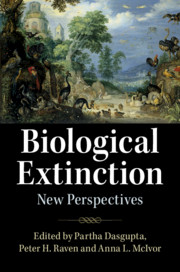Book contents
- Biological Extinction: New Perspectives
- Biological Extinction: New Perspectives
- Copyright page
- Dedication
- Contents
- Figures
- Tables
- Contributors
- Preface
- Acknowledgements
- Introduction
- Prologue
- 1 Extinction in Deep Time
- 2 Biodiversity and Global Change
- 3 The State of the World’s Biodiversity
- 4 Extinction Threats to Life in the Ocean and Opportunities for Their Amelioration
- 5 Out of the Soil
- 6 The Green Revolution and Crop Biodiversity
- 7 Population
- 8 Game Over?
- 9 Why We’re in the Sixth Great Extinction and What It Means to Humanity
- 10 The Consequences of Biodiversity Loss for Human Well-Being
- 11 Terra Incognita
- 12 How Do We Stem Biodiversity Loss?
- 13 Can Smart Villages Help to Stem Biodiversity Loss?
- 14 The New Design Condition
- Index
- Plate Section (PDF Only)
- References
10 - The Consequences of Biodiversity Loss for Human Well-Being
Published online by Cambridge University Press: 19 August 2019
- Biological Extinction: New Perspectives
- Biological Extinction: New Perspectives
- Copyright page
- Dedication
- Contents
- Figures
- Tables
- Contributors
- Preface
- Acknowledgements
- Introduction
- Prologue
- 1 Extinction in Deep Time
- 2 Biodiversity and Global Change
- 3 The State of the World’s Biodiversity
- 4 Extinction Threats to Life in the Ocean and Opportunities for Their Amelioration
- 5 Out of the Soil
- 6 The Green Revolution and Crop Biodiversity
- 7 Population
- 8 Game Over?
- 9 Why We’re in the Sixth Great Extinction and What It Means to Humanity
- 10 The Consequences of Biodiversity Loss for Human Well-Being
- 11 Terra Incognita
- 12 How Do We Stem Biodiversity Loss?
- 13 Can Smart Villages Help to Stem Biodiversity Loss?
- 14 The New Design Condition
- Index
- Plate Section (PDF Only)
- References
Summary
Biodiversity is frequently thought of as synonymous with species diversity in wild lands, and biodiversity loss is frequently thought of as synonymous with the extinction of wild species. But biodiversity is much more than species diversity in wild lands, and biodiversity loss is much more than species extinction. Biodiversity is the variety of species used in both the production and consumption of goods and services. Examples include the ornamental plants, birds and animals that people use to enrich their lives, the variety of foods they use to enrich their diet, the mix of biofuels or biofibres used to support productive activities. It includes the genetic diversity of cultivated crops, of crop pests, of wild crop relatives, of weedy species. It includes the range of biotic disease agents that affect human, animal and plant health, and the species used to control disease such as traditional medicinal plants and the plants used as the source of modern pharmaceuticals.
- Type
- Chapter
- Information
- Biological ExtinctionNew Perspectives, pp. 285 - 308Publisher: Cambridge University PressPrint publication year: 2019



